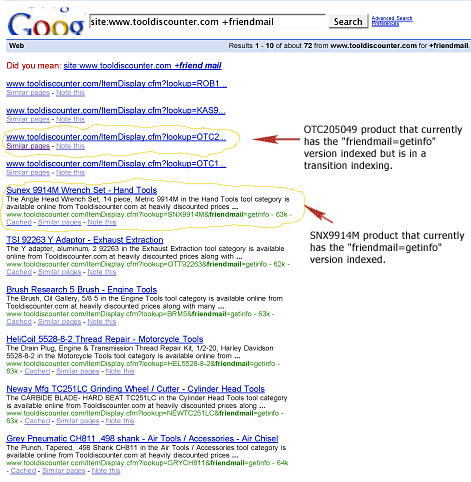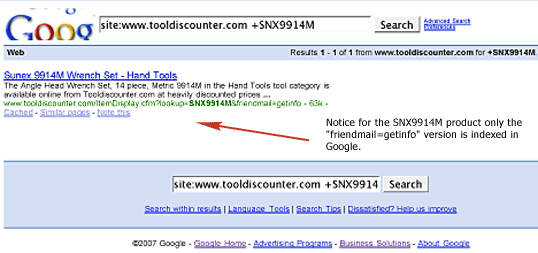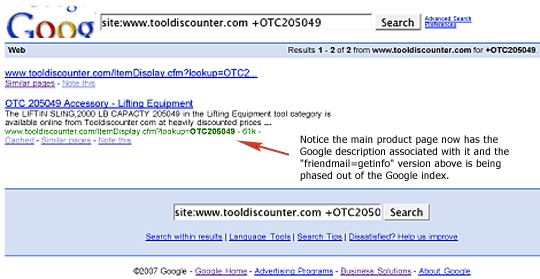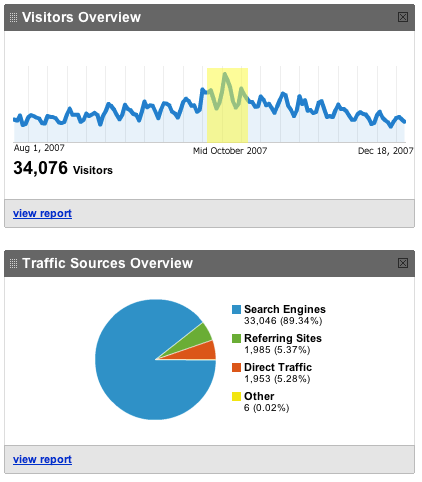Recent SEO work done by us on a massive ecommerce site (more than 8000 products) illustrated the importance of the duplication penalty and how it was affecting individual product pages and preventing them from achieving high-ranking SERPs.
I will try to highlight this issue, how we solved it, and how it subsequently produced a two-fold increase in traffic and hundreds of top 5 rankings in Google for individual product terms.
This issue first became apparent when our client asked us why many of his products were not showing up in keyword search results. We did some preliminary analysis and determined that a link on every product page that sent the visitor to a "Send this page to a friend" page was the culprit. Normally these "Send to a friend" scripts do not interfere with the search engines in any noticeable way. However this link was coded as a PHP script which essentially replicated exactly everything on the product page and just added a couple of form fields to allow the visitor to email the product page to a friend.
The following two links highlights the subtle differences between the normal product page and its parallel "Send to a friend" page.
tooldiscounter.com/ItemDisplay.cfm?lookup=OTC205049
and the "Send to a friend" link.
tooldiscounter.com/ItemDisplay.cfm?lookup=OTC205049&friendmail=getinfo
Notice the coding is not 100% identical between these two pages but it is identical enough (>80%) for Google to decide that it should not index both pages. For whatever reason the Google spiders ended up picking one or the other. Now it doesn't take an SEO specialist to tell you that the original product page will rank better than the "Send to a friend" version of the same page.
So we did the simple search in Google "site:www.tooldiscounter.com +friendmail" and found out that thousands of the "Send to a friend" version of the product pages had been indexed instead of the original product page. The following three figures illustrate the differences:

Figure 1 shows 72 results when you find all the specific "Send to a friend" Tooldiscounter pages that are remaining in the Google index. Note this was in the thousands before we took steps to get these duplicate pages out of the Google index so that the original product pages could be indexed instead. If you look at Figure 1 it shows that the first 4 results do not have descriptions and these appear to be results that are being phased out. In fact it is very likely that these results are already gone due to our recent efforts. The next 6 results show the remaining "Send to a friend" versions of the product pages that have not yet been marked for removal in the Google index. Figure 2 below show the results when you do a Google search specific for all the pages in the Tooldiscounter site that display the "SNX9914M" product. Notice only the "Send to a friend" page shows up and the original product page does not appear.

In comparison figure 3 (below) shows when you do a search for all the pages in the Tooldiscounter site that show the "OTC205049" product you see two pages. The old "Send to a friend" version and now the main product page which was not previously indexed. As a result this product page now ranks #6 on Google for "OTC-205049" which was unranked before.

Figure 3:
Kind regards,
SlickRockWeb Inc. a leading provider of affordable SEO services -- "Bringing you business one click at a time."




